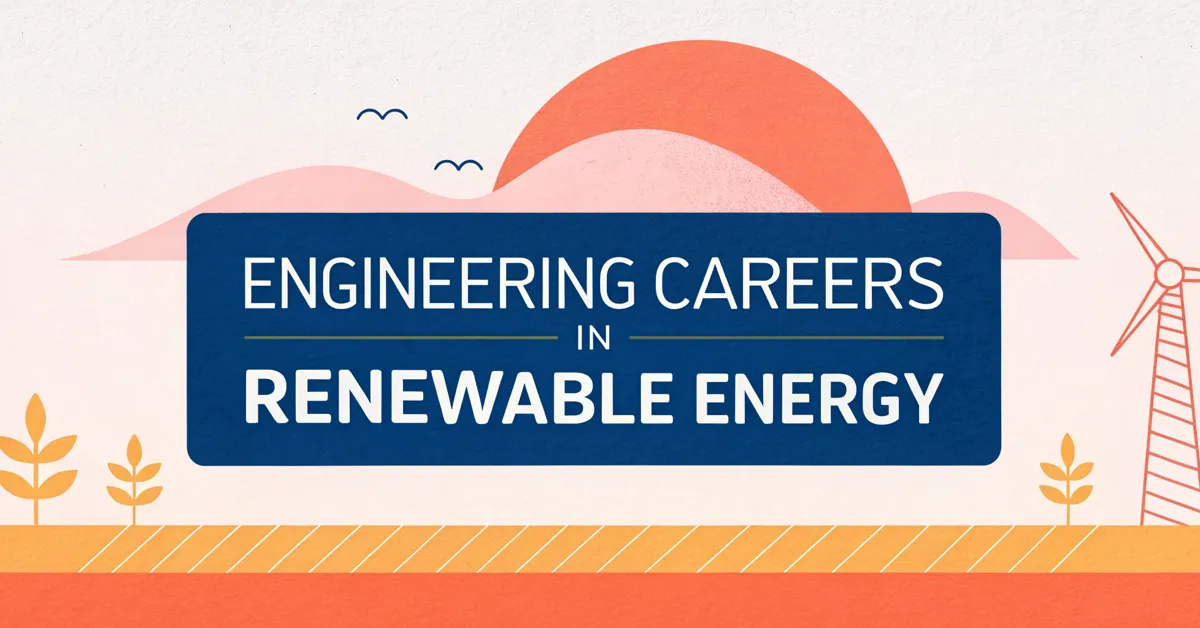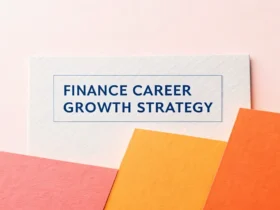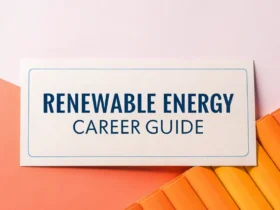The race to save our planet is on, and it’s being fueled by a new kind of energy – renewable energy. Are you an engineering student who wants to put your skills to work for a better future? The renewable energy sector is a good place to start. But navigating the landscape of engineering jobs in this growing field can feel a little daunting.
This guide cuts through the noise and shines a light on the many chances that exist for engineers within renewable energy. We’ll go over the different paths you can take, the skills you’ll need, and the impact you can have. Get ready to explore an exciting career where your engineering expertise meets a passion for sustainability.
Engineering Careers in Renewable Energy
Engineering jobs in renewable energy involve using science and math to create, improve, and maintain sources of clean power. Think solar, wind, hydro, geothermal, and biomass. These jobs are vital for cutting down on pollution, fighting climate change, and creating a future where energy is sustainable for everyone.
But what specific roles are out there for engineers in this field? Let’s dive into some of the most common and exciting paths you can take.
Solar Energy Engineer
Solar engineers are at the forefront of harnessing the sun’s power. They are responsible for designing, developing, and implementing solar energy systems. These systems range from small rooftop installations to big solar farms. Their tasks can include:
- Design: Making plans for effective solar energy systems.
- Research and Development: Finding new materials and methods to improve solar tech.
- Installation and Maintenance: Overseeing the setup and upkeep of solar systems.
- Testing and Optimization: Checking how well systems work and making them better.
- Project Management: Leading solar projects from start to finish.
A solar energy engineer must have a solid grasp of thermodynamics, heat transfer, and semiconductor physics. They use software such as PVsyst or Solar Design Studio. They must also stay on top of industry trends and government rules for solar energy.
Wind Energy Engineer
Wind energy engineers are focused on capturing the power of the wind. Their work is key to making wind farms efficient, reliable, and sustainable. Here’s what they do:
- Turbine Design: Creating better wind turbines.
- Site Assessment: Choosing places where wind turbines will work best.
- Installation and Maintenance: Taking care of the setup and running of wind farms.
- Performance Analysis: Checking how well turbines work and finding ways to make them better.
- Environmental Impact Studies: Looking at how wind farms affect the environment.
These engineers need a good background in aerodynamics, structural mechanics, and electrical engineering. They use tools such as MATLAB and WindFarmer. They also have to keep up with the newest tech and rules for wind energy projects.
Hydro Energy Engineer
Hydro energy engineers deal with power from water. They are involved in designing, building, and running hydroelectric power plants. They can work on:
- Dam and Turbine Design: Making dams and turbines work better together.
- Hydrological Studies: Learning about water flow and how it can be used to make power.
- Plant Construction and Maintenance: Overseeing the building and upkeep of hydro plants.
- Environmental Impact Assessment: Checking how hydro projects affect nature.
- Regulatory Compliance: Making sure projects follow all the rules.
Hydro engineers need to know about fluid mechanics, hydrology, and civil engineering. They often use software such as HEC-RAS and AutoCAD. They also need to be aware of the environmental and social effects of hydro projects.
Geothermal Engineer
Geothermal engineers tap into the earth’s heat for energy. Their work involves finding, developing, and managing geothermal resources. Their duties might include:
- Resource Exploration: Locating geothermal spots.
- Drilling and Well Design: Planning how to drill wells to get to the heat.
- Power Plant Design: Making geothermal plants efficient and reliable.
- Reservoir Management: Keeping geothermal resources sustainable.
- Environmental Protection: Reducing the impact of geothermal projects on the environment.
These engineers need to understand geology, thermodynamics, and heat transfer. They use tools such as TOUGH2 and PetraSim. They also have to stay updated on the latest tech and rules for geothermal energy.
Biomass Engineer
Biomass engineers work with organic matter to create energy. This includes turning plants, wood, and waste into power. Their tasks can be:
- Feedstock Selection: Choosing the right materials for biomass energy.
- Conversion Technology Development: Finding better ways to turn biomass into energy.
- Plant Design and Operation: Making biomass plants work well.
- Emissions Control: Reducing pollution from biomass energy.
- Sustainability Assessment: Making sure biomass energy is good for the environment.
Biomass engineers must understand chemistry, chemical engineering, and environmental science. They use software such as Aspen Plus and CHEMCAD. They also need to know about environmental rules and sustainable practices.
The Necessary Skills for Renewable Energy Engineers
To excel in renewable energy engineering, you’ll need a mix of technical skills, soft skills, and specific knowledge about renewable resources. Here’s a rundown of the core competencies that will set you apart:
Technical Skills
- Engineering Design: Expertise in creating and improving renewable energy systems.
- Data Analysis: Being able to understand and use data to make smart decisions.
- Software Proficiency: Knowing how to use industry-specific software for modeling, simulation, and design.
- System Optimization: Finding ways to make systems work better.
- CAD/CAM Skills: Being able to use Computer-Aided Design and Manufacturing software.
Soft Skills
- Problem-Solving: Finding creative solutions to technical challenges.
- Communication: Explaining complicated ideas clearly to different people.
- Teamwork: Working well with others in group projects.
- Project Management: Leading projects from beginning to end.
- Adaptability: Being able to change plans as needed.
Renewable Energy Knowledge
- Renewable Energy Sources: Being deeply aware of how solar, wind, hydro, geothermal, and biomass energy work.
- Energy Storage: Knowing how to store energy effectively.
- Grid Integration: Understanding how renewable energy connects to the power grid.
- Policy and Regulation: Keeping up with rules about renewable energy.
- Sustainability Principles: Using methods that are good for the environment.
Education and Training Paths
To get into renewable energy engineering, you’ll need the right education and training. Here are the main steps to take:
Bachelor’s Degree
Start with a bachelor’s degree in a related field, such as:
- Mechanical Engineering: This provides a strong base in mechanics, thermodynamics, and design.
- Electrical Engineering: Important for understanding power systems and grid integration.
- Civil Engineering: Needed for building dams and other hydro structures.
- Environmental Engineering: Focuses on sustainability and environmental impact.
- Chemical Engineering: Useful for biomass and other chemical conversion processes.
Advanced Degrees
Think about getting a master’s or Ph.D. for more specialized knowledge:
- Master’s in Renewable Energy Engineering: Provides focused knowledge and skills for the industry.
- Ph.D. in a Related Field: Required for research and development roles.
Certifications
Getting certified can boost your career:
- Certified Energy Manager (CEM): Shows you know about energy efficiency.
- LEED Accreditation: Demonstrates expertise in green building practices.
- NABCEP Certification: Recognizes expertise in solar installation.
Internships and Co-op Programs
Internships and co-op programs are vital for gaining hands-on experience. They allow you to apply what you’ve learned in school to real-world projects. Seek out opportunities with renewable energy companies, research institutions, and government agencies. These experiences not only enhance your skills but also build your professional network.
Finding the Right Engineering Job
Landing your ideal job in renewable energy engineering requires a strategic approach. Here’s how to navigate the job market effectively:
Networking Opportunities
Networking is key to finding the right job. Attend industry conferences, join professional organizations, and connect with professionals on LinkedIn. These connections can provide insights, mentorship, and job leads.
Online Job Boards
Use online job boards to find openings:
- Indeed: A broad job board with many engineering positions.
- LinkedIn: A professional networking site with job postings.
- Glassdoor: Provides company reviews and salary information.
- Specialized Boards: Look for job boards specific to renewable energy.
Company Websites
Check the career pages of renewable energy companies directly. Many companies post openings on their websites before listing them elsewhere.
Government Agencies
Look for jobs with government agencies involved in renewable energy. These roles can offer stable employment and opportunities to work on large-scale projects.
Resume Building
Craft a compelling resume that highlights your relevant skills and experience. Emphasize projects, internships, and coursework related to renewable energy. Use keywords from job descriptions to tailor your resume to each application.
The Future Outlook of Engineering in Renewable Energy
The future for engineers in renewable energy is shining bright. As the world shifts toward cleaner energy, the demand for skilled engineers is expected to grow.
Industry Growth
The renewable energy sector is growing rapidly, driven by:
- Government Policies: Incentives and mandates supporting renewable energy.
- Technological Advances: Innovations making renewable energy more efficient and affordable.
- Environmental Concerns: Growing awareness of climate change.
- Economic Benefits: Renewable energy creating jobs and boosting local economies.
Job Growth
The U.S. Bureau of Labor Statistics projects strong job growth for engineers in renewable energy:
- Electrical Engineers: Expected to grow by 3% from 2022 to 2032.
- Mechanical Engineers: Projected to increase by 2% from 2022 to 2032.
- Environmental Engineers: Expected to grow by 4% from 2022 to 2032.
This growth is fueled by investments in renewable energy infrastructure and the need for engineers to design, build, and maintain these systems.
Emerging Trends
Stay informed about new technologies and methods:
- Advanced Materials: New materials improving efficiency and durability.
- Smart Grids: Technologies integrating renewable energy into the grid.
- Energy Storage: Innovations in batteries and other storage solutions.
- Artificial Intelligence (AI): AI optimizing energy systems and predicting performance.
- IoT (Internet of Things): IoT devices monitoring and managing energy use.
Making a Real Impact
Choosing a career in renewable energy engineering is about more than just a job—it’s about making a difference. By applying your skills and knowledge, you can:
- Reduce Carbon Emissions: Help lower greenhouse gases and fight climate change.
- Promote Energy Independence: Create a future where countries rely less on fossil fuels.
- Create Sustainable Solutions: Develop energy systems that are good for the environment.
- Drive Innovation: Push the boundaries of what’s possible in renewable energy.
- Improve Public Health: Reduce pollution and make communities healthier.
Are you still unsure if renewable energy engineering is the best path for you? Here is something to keep in mind. According to data gathered by LinkedIn, jobs in sustainability have been growing at 13% annually over the past five years. That data set is as of the end of 2023, but that speaks volumes about the industry itself. If the amount of jobs in the market is growing that fast, it is safe to say the career prospects will be positive for quite some time.
The world needs bright, passionate engineers to drive the renewable energy revolution. With the right education, skills, and determination, you can play a key role in creating a sustainable future for all. So, if you’re ready to combine your engineering talents with a passion for the planet, then a career in renewable energy is the answer you have been looking for.















Leave a Reply
View Comments